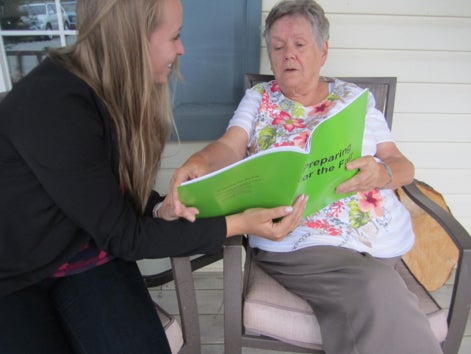

You’ve probably seen the videos where elderly people with dementia who struggle to communicate at all brighten up and respond when big band music is played. Rachel Thompson’s family had a similar experience when Rachel's grandmother, who has advanced dementia and who struggles to recognize family members or to put words together to communicate, was able to read aloud newspaper headlines.
Rachel had also had an experience with her other grandmother who, post-surgery, was unable to read more than a few pages of a book, due to medication that altered her attention span.
Rachel, who was in her final term of the Health Studies program at UWaterloo, shifted the focus of her final project in her experimental research methods to look at the effects of reading on people with Alzheimer’s and dementia.
There have been many studies about the benefits of music and exercise for people with Alzheimer’s/dementia, but Rachel found fewer than 10 articles looking at the effects of reading on people with cognitive decline.
All the studies, however, noted that there was a positive correlation between reading and mental stimulation. It also became clear that reading, like walking, was often one of the last skills to go with people with dementia, because it is operated by the procedural part of the brain.
Rachel’s experience with her grandmother and her degree in health studies showed her the value of reading in creating both meaningful leisure opportunities for people with Alzheimer’s/dementia who have always enjoyed reading, and also brain-stimulating activities, something that is often in short supply.
The challenge was finding the right reading material: large newspaper headlines were good, but the newspapers themselves were often busy, with fonts too small for older eyes to read. Children’s picture books with larger print could be substituted, but Rachel felt those books would compromise the dignity of older adult readers, and also would not reflect their interests.
She decided to set up a social venture—named after her grandmothers—that would curate and publish books for older adults who suffer from cognitive impairments. She pitched her social enterprise, Marlena, at GreenHouse’s Big Ideas Challenge and was awarded a term at GreenHouse.
“GreenHouse has definitely been very exciting. A lot of us in GreenHouse this term aren’t business students, so GreenHouse has offered us a crash course to gain the skills and knowledge we need. Many of us are in the prototype stage, and we have had a lot of help in looking for funding.”
This summer, Rachel is developing and testing a prototype book, examining factors such as whether or not to include pictures, what visual cues help a reader, what paper thickness enables easier reading, etc.
Rachel’s family is very supportive and excited for her—not only because they are all eager to find ways to support their grandmother, but also because they see her being fulfilled in this new venture. “My dad owns his own business, and he’s excited to see me pursuing a business path, even if it’s very different from his.”
Rachel says she has mixed feelings about capitalizing on the struggles of an aging population, but also knows that this business meets a growing need—what some have called the “gray tsunami.” She cites statistics: In 2011, 15 percent of Canadians over 65 are dealing with dementia; by 2031, 1.4 million Canadians will be living with dementia, 70 percent of them women.
“A year ago,” Rachel says, “I would never have imagined I would do something like this. I’ve always had an entrepreneurial side but I didn’t find a way during my health degree to connect my degree with my business side. I didn’t know there were all these opportunities to develop a business. It all came together at the right time.”
- by Susan Fish
Hear Kwame Ansong's podcast interview with Rachel